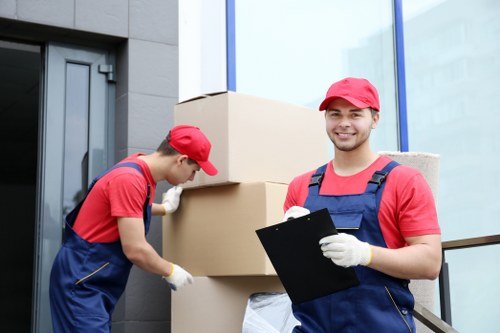Council Rubbish Collection in Great Bookham

Maintaining a clean and orderly environment is essential for the well-being of any community. In Great Bookham, the council rubbish collection services play a pivotal role in ensuring that waste is managed efficiently and responsibly.
Understanding how rubbish collection works in Great Bookham can help residents contribute to a cleaner neighborhood. This guide provides an in-depth look at the services offered, schedules, and guidelines to make the most of the council's waste management system.
From regular collections to special disposal services, Great Bookham's council is committed to keeping the town tidy and environmentally friendly.
Overview of Great Bookham Council Rubbish Collection

The Great Bookham council offers comprehensive rubbish collection services designed to meet the needs of its residents. These services cover various types of waste, including general household rubbish, recycling, green waste, and bulky items.
The council provides different bins for different types of waste, ensuring that each category is collected and processed appropriately. This system not only helps in efficient waste management but also promotes recycling and environmental sustainability.
Residents are encouraged to follow the guidelines set by the council to ensure smooth and timely collection of their rubbish.
Rubbish Collection Schedule

Great Bookham council operates a structured rubbish collection schedule to accommodate the needs of its community. Typically, general waste is collected once a week, while recycling and green waste have their designated collection days.
Residents receive a collection calendar at the beginning of each year, outlining the specific days for each type of waste. It's important to adhere to these schedules to ensure that bins are emptied promptly and efficiently.
During holidays or special events, the council may adjust collection dates. Residents are advised to stay updated through the council's official website or local notifications.
Types of Rubbish Collection Services

The council offers several types of rubbish collection services to cater to different waste management needs:
- General Waste Collection: For everyday household rubbish that isn't recyclable or compostable.
- Recycling Collection: Dedicated to recyclable materials like paper, plastics, glass, and metals.
- Green Waste Collection: For organic waste such as garden clippings, leaves, and branches.
- Bulky Waste Collection: For large items that don't fit in regular bins, such as furniture and appliances.
- Hazardous Waste Collection: Specialized services for disposing of hazardous materials safely.
Each service is designed to handle specific types of waste, ensuring that everything is disposed of in an environmentally responsible manner.
Guidelines for Rubbish Collection

To facilitate efficient rubbish collection, the council has established several guidelines that residents must follow:
- Proper Sorting: Separate your waste into the appropriate bins to aid in recycling and waste processing.
- Bin Placement: Place your bins at the designated collection points by the curb on the scheduled day.
- Bin Maintenance: Ensure that lids are secured and bins are clean to prevent pest issues and maintain hygiene.
- Bulky Waste Scheduling: Arrange for bulky waste collection in advance, adhering to the council's schedule and guidelines.
- Prohibited Items: Avoid placing hazardous or restricted items in regular waste bins. Use designated collection services for these materials.
Following these guidelines helps the council manage waste more effectively and reduces the chances of missed collections or contamination of recyclable materials.
Recycling Initiatives in Great Bookham
Recycling plays a crucial role in the council's waste management strategy. By recycling, residents can help reduce landfill waste, conserve natural resources, and promote environmental sustainability.
The council provides specific bins for recyclable materials and ensures that these items are processed appropriately. Common recyclable items include:
- Paper and cardboard
- Plastics and packaging
- Glass bottles and jars
- Metals and tin cans
- Electronic waste
Great Bookham also hosts regular recycling drives and events to encourage community participation in recycling efforts.
Green Waste Management
Managing green waste is essential for maintaining the town's green spaces and gardens. The council's green waste collection service is designed to handle organic materials that can be composted or otherwise recycled.
Residents can dispose of garden clippings, leaves, branches, and other organic waste through designated green waste bins. This waste is then processed into compost, which can be used to enrich the soil and support local green initiatives.
Proper green waste management helps reduce methane emissions from landfills and supports the town's commitment to sustainability.
Bulky Item Collection Services
Sometimes, residents need to dispose of large or bulky items that don't fit in regular bins. The council offers a bulky item collection service to handle these items responsibly.
Eligible items include old furniture, appliances, mattresses, and other large household items. It's important to schedule bulky waste collections in advance and follow the council's guidelines for preparing items for pickup.
This service ensures that bulky items are recycled or disposed of properly, reducing environmental impact and maintaining community cleanliness.
Special Disposal Services
In addition to regular and bulky waste collection, the council provides special disposal services for hazardous and electronic waste.
Hazardous waste includes chemicals, paints, batteries, and other materials that require careful handling to prevent environmental contamination. Electronic waste covers old electronics like computers, televisions, and phones.
Residents should use designated collection points or attend special collection events organized by the council to dispose of these items safely.
Penalties for Improper Rubbish Disposal
To maintain the effectiveness of the rubbish collection program, the council enforces penalties for improper disposal of waste. Violations may include:
- Placing waste out of hand during collection days.
- Failing to sort waste correctly into designated bins.
- Dumping prohibited items in regular waste streams.
- Non-compliance with bulky waste scheduling.
Fines and other penalties may be imposed on residents who do not adhere to the council's waste management guidelines. It is essential to follow all rules to avoid these penalties and contribute to a cleaner community.
Recycling Centers and Drop-Off Points
For items that cannot be disposed of through regular collection services, the council operates several recycling centers and drop-off points throughout Great Bookham.
These facilities accept a wide range of materials, including paper, plastics, metals, glass, electronics, and hazardous waste. They provide a convenient way for residents to dispose of specific types of waste responsibly.
Visiting a recycling center helps reduce landfill use and supports the town's recycling goals. Residents are encouraged to utilize these facilities as needed.
Environmental Impact of Effective Rubbish Collection
Effective rubbish collection and waste management have a significant positive impact on the environment. By properly managing waste, Great Bookham reduces its carbon footprint, conserves natural resources, and minimizes pollution.
Recycling and composting lower the need for raw materials, decrease energy consumption, and reduce greenhouse gas emissions. Moreover, proper waste disposal prevents landfill overflow and contamination of local water sources.
Residents play a crucial role in this process by adhering to collection schedules, sorting waste correctly, and participating in recycling initiatives.
Community Involvement and Education
The council recognizes the importance of community involvement in achieving effective waste management. Educational programs and community events are regularly organized to raise awareness about the benefits of proper rubbish disposal and recycling.
Schools, local organizations, and community groups are encouraged to participate in these initiatives to foster a culture of environmental responsibility.
By working together, the community can make significant strides in maintaining a clean and sustainable Great Bookham.
10-15 Closest Areas to Great Bookham
Great Bookham is surrounded by several nearby areas that also benefit from the council's rubbish collection services. Understanding the proximity and unique features of these areas can help residents navigate waste management effectively.
- Bookham Green: Located just 1 mile from Great Bookham, Bookham Green shares similar waste collection schedules and participates in joint recycling initiatives.
- Thorpe Green: Approximately 2 miles away, Thorpe Green has access to all primary rubbish collection services offered in Great Bookham.
- Hersham: Situated 3 miles from Great Bookham, Hersham residents benefit from both regular and specialized waste collection programs.
- Oxshott: 4 miles away, Oxshott has its own set of guidelines but collaborates closely with Great Bookham for bulk waste management.
- Fetcham: Located 5 miles from Great Bookham, Fetcham offers additional recycling options and community drop-off points.
- Chertsey: At a distance of 6 miles, Chertsey works in tandem with Great Bookham for hazardous waste disposal and electronic recycling.
- Hook: 7 miles away, Hook shares similar collection schedules and participates in regional waste reduction programs.
- Byfleet: Situated 8 miles from Great Bookham, Byfleet residents have access to both local and regional rubbish collection services.
- West Byfleet: 9 miles away, West Byfleet offers flexible waste collection options, including additional recycling drives.
- East Molesey: 10 miles from Great Bookham, East Molesey collaborates on large-scale waste management projects and environmental initiatives.
- Virginia Water: Located 11 miles away, Virginia Water benefits from specialized recycling centers and eco-friendly waste solutions.
- Sunningdale: 12 miles from Great Bookham, Sunningdale participates in community-led waste reduction and recycling programs.
- Worplesdon: At 13 miles, Worplesdon has access to all standard and special rubbish collection services provided by the council.
- Byfleet and New Haw: 14 miles away, this area enjoys comprehensive waste management services similar to Great Bookham.
- New Melcombe: Located 15 miles from Great Bookham, New Melcombe residents benefit from enhanced recycling facilities and environmental support.
These nearby areas share a commitment to effective rubbish collection and environmental sustainability, working together to maintain a clean and healthy region.
Benefits of Council Rubbish Collection
The council's rubbish collection services offer numerous benefits to the residents of Great Bookham and surrounding areas:
- Convenience: Regular and scheduled collections make waste disposal hassle-free for residents.
- Environmental Protection: Proper waste management reduces pollution and conserves natural resources.
- Public Health: Clean environments minimize the risk of disease by preventing waste accumulation and pest infestations.
- Community Aesthetics: Effective rubbish collection keeps the town clean and visually appealing.
- Economic Savings: Recycling and waste reduction programs can lead to cost savings for the council and residents.
These benefits underscore the importance of adhering to the council's waste management guidelines and participating in available services.
How to Report Missed or Irregular Collections
Occasionally, residents may experience missed or irregular rubbish collections. The council has established clear procedures to address these issues promptly.
Residents can report missed collections through the council's official website, phone hotline, or email support. Providing specific details, such as address and type of waste, can help resolve the issue more efficiently.
The council aims to ensure that all reported problems are addressed swiftly to maintain the integrity of the rubbish collection services.
Tips for Reducing Household Waste
Reducing household waste not only benefits the environment but also eases the burden on the council's rubbish collection services. Here are some practical tips for minimizing waste:
- Reuse and Repurpose: Find new uses for items instead of discarding them.
- Minimal Packaging: Choose products with minimal or recyclable packaging.
- Composting: Compost organic waste to create nutrient-rich soil for gardening.
- Digital Alternatives: Opt for digital versions of documents and media to reduce paper waste.
- Purchase Quality: Invest in durable products that last longer to decrease the frequency of replacements.
Implementing these strategies can lead to significant waste reduction and promote a sustainable lifestyle.
Future Developments in Rubbish Collection
The council is continuously seeking ways to improve rubbish collection services. Future developments may include:
- Enhanced Recycling Technologies: Implementing advanced sorting and processing technologies to increase recycling efficiency.
- Electric Collection Vehicles: Transitioning to eco-friendly vehicles to reduce carbon emissions.
- Community Recycling Programs: Expanding recycling initiatives to engage more residents and organizations.
- Smart Waste Management: Utilizing technology for real-time monitoring and optimization of waste collection routes.
- Educational Campaigns: Increasing awareness about waste reduction and recycling through targeted campaigns.
These initiatives aim to make rubbish collection more sustainable, efficient, and responsive to the community's needs.
Conclusion
Effective rubbish collection is vital for maintaining the cleanliness, health, and sustainability of Great Bookham and its surrounding areas. By understanding the council's services, adhering to schedules, and following waste management guidelines, residents can contribute significantly to a cleaner and greener community.
Engaging in recycling, reducing household waste, and participating in community initiatives further enhance the impact of these efforts. Together, the council and residents can ensure that Great Bookham remains a pristine and environmentally responsible town.
Stay informed, stay compliant, and take pride in contributing to the well-being of your community.
Frequently Asked Questions
1. How can I find out my rubbish collection day in Great Bookham?
You can find your specific rubbish collection day by visiting the Great Bookham council website and entering your address in the collection scheduler tool. Additionally, the council provides a printed collection calendar to all residents at the start of each year.
2. What items are prohibited from regular rubbish collection?
Prohibited items include hazardous materials such as chemicals, paints, batteries, and electronic waste. These items should be disposed of through designated hazardous waste collection services or drop-off points. Bulky items like furniture and appliances also require special scheduling for collection.
3. How do I schedule a bulky waste collection?
To schedule a bulky waste collection, contact the Great Bookham council through their official website, phone hotline, or email support. Provide details about the items you need to dispose of, and the council will arrange a convenient pickup date.
4. Are there any fees for rubbish collection services in Great Bookham?
Most standard rubbish collection services, including general waste, recycling, and green waste, are provided free of charge to residents. However, there may be fees for special services such as bulky waste collection or disposal of hazardous materials. Check the council's website for detailed information on any applicable fees.
5. How can I reduce my household waste?
Reducing household waste can be achieved by reusing and repurposing items, minimizing packaging, composting organic waste, opting for digital alternatives, and purchasing high-quality, durable products. Implementing these practices not only decreases the amount of waste you produce but also supports the council's waste management efforts.